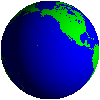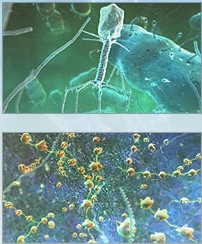 The Imperiled Planet:
The Imperiled Planet: a study in dominance and responsibility.
By J. Siry, Ph D.
 The Imperiled Planet:
The Imperiled Planet:
a study in dominance and responsibility.
By J. Siry, Ph D.
"…Environmental concerns have become of paramount importance. We are faced with a whole series of global problems that are harming the biosphere and human life in alarming ways that may soon become irreversible.
The more we study the major problems of our time, the more we come to realize that they cannot be understood in isolation."
Fritjof Capra, U. C. Berkeley physicist. *
![]()
Why study a virus? "The science of virology is still in its early, wild days," says science writer Carl Zimmer. He argues that "Scientists are discovering viruses faster than they can make sense of them." The Earth's atmosphere is determined in large part by ocean bacteria; every day viruses kill half of them. Every year in the oceans, viruses transfer a trillion trillion genes between host organisms. They evolve faster than anything else, and they are a major engine of the evolution of the rest of life. Our own bodies are made up of 10 trillion human cells, 100 trillion bacteria, and 4 trillion very busy viruses. Some of them kill us. Many of them help us. Some of them are us. Viral time is ancient and blindingly fast. What if viruses are the ultimate shufflers of the DNA/RNA decks we all play the game of life with and in some collaborative sense allow all of us to set the boundaries of the game we all play?
 Microbes are our best friends!
Microbes are our best friends!
| Readings
for the class : |
|
 |
|
Science Images: Science Daily |
|
![]()
Diagram 1: the "anorganic and organic conditions of existence" to which life, Darwin and Huxley insisted, adapts.
Meaning:
![]()
This course examines who we are, where we are, and what we ought to do with what we know.
The Imperiled planet is an introduction to the life and physical sciences from an ecological perspective focusing on the capability and culpability of human civilization for bringing the earth to several tipping points of crisis due to consumption, population, and technological growth. Our species has far greater capacity to alter the oceans, air, and land masses than we together possess the imagination and/or the will to alter our behavior.
With special emphasis on recent findings, we explore the unity of science, the power of technology and the psychology of cultural adaptation to this now historically unprecedented and rapidly deteriorating status of the earth's life sustaining features as a systematically functioning, self-sustaining, ecological services provider.
For every week, the second meeting of our class we will all be tutoring students in local grammar schools with reading and writing about the earth so that we can engage our peers in learning more about the wonders of our world revealed by science and mathematics.
![]()
Capra, Fritjof. The Web of Life. New York: Anchor Books,1995. pp. 3-5.
Gell-Mann, Murray. The Quark and the Jaguar. pp. 11-58.
Hardin, Garrett. Living within Limits, pp. 40-65.
![]()
![]()
Mayr | Thomas | Wilson | Hardin | Darwin | Margulis | Steingraber | Carr | Keller | Watson
Readings | Vocabulary | Description | Overview | Assignments | Lectures | Index for this course | Grades
technology
index ![]() science index
science index ![]() gene index
gene index ![]() social science index
social science index ![]() photograph index
photograph index ![]() Darwin Index
Darwin Index